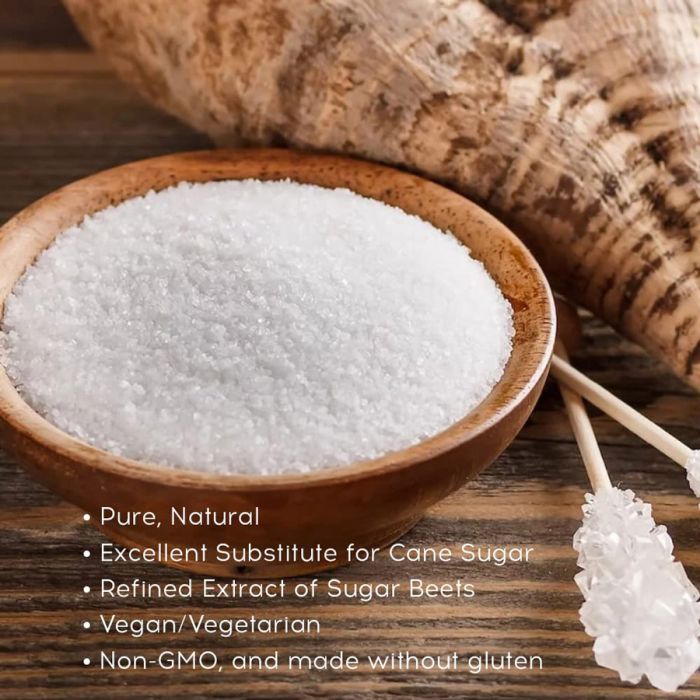A Detailed Take A Look At the Perks and Uses of Beet Sugar Vs Cane Sugar for Sweetening Options
In the realm of sweetening, both beet sugar and cane sugar deal distinct advantages and culinary duties, albeit with similar dietary profiles. While beet sugar boasts a neutral taste ideal for various dishes, cane sugar enriches recipes with subtle caramel touches.
Origins and Handling Techniques of Beet Sugar and Cane Sugar
Beet sugar and cane sugar, 2 predominant sweeteners, originate from really distinctive plants and undergo different handling methods. Beet sugar is drawn out from the sugar beet, an origin veggie, mainly grown in cooler climates.
Alternatively, cane sugar originates from the sugarcane plant, a tropical turf. Its handling begins with collecting the cane, crushing it to acquire the juice, and afterwards steaming this liquid to form sugar crystals. The remaining molasses-rich liquid can be re-boiled multiple times to create varying qualities of sugar. This procedure, although somewhat similar in its goal, differs substantially in regards to the ecological conditions required for growing and the preliminary actions in extracting sugar. beet sugar vs cane sugar. Each method reflects adaptations to the respective plant's natural habitats and homes.
Nutritional Comparison: Beet Sugar Versus Cane Sugar

When contrasting the nutritional material of beet sugar and cane sugar, it comes to be noticeable that both types offer a similar power value. Both beet and cane sugar are 99.9% pure sucrose, making them basically identical in terms of calorie web content and nutritional profile.
Nevertheless, mild distinctions might arise from the minimal trace aspects that stay after handling, though these are as well small to effect general wellness. For example, cane sugar can preserve traces of molasses, depending upon the degree of refining, which may add small quantities of calcium, iron, and potassium. Beet sugar, on the various other hand, commonly undergoes a process that eliminates these micronutrient better, leading to an also purer type of sucrose.
Culinary Uses and Flavor Profiles
Regardless of their dietary similarities, beet sugar and cane sugar diverge notably in their culinary applications and flavor subtleties. Beet sugar, acquired from sugar beetroots, usually has an extremely neutral taste, making it a favored choice in baking where it perfectly incorporates without changing the flavor profile of various other active ingredients.
Cooks and home chefs alike choose sugars based on these features. While both sugars operate likewise in terms of sweetness and physical buildings, the mild flavor difference can affect the end result of a meal dramatically, assisting the option between beet and cane sugar based upon the preferred outcome in culinary creations.
Health Effects of Consuming Beet and Cane Sugars
Although beet sugar and cane sugar are typically utilized reciprocally in food preparation and baking, their health ramifications can differ discreetly due to their distinct processing techniques. Both sugars offer concerning the exact same quantity of calories and carbohydrates per tsp, basically providing comparable energy payments with no intrinsic dietary advantages. Nevertheless, the this page refining procedure for each and every sugar can change the visibility of trace minerals and compounds, although these variations are commonly very little and not considerable adequate to impact one's health and wellness meaningfully.
The main health and wellness interest in both sorts of sugar refer to their payment to excessive calorie intake, potentially bring about weight gain, and involved illness like type 2 diabetic issues and heart problem when consumed in large quantities. Therefore, no matter of the resource, moderation is type in consuming beet or cane sugars. Wellness specialists usually advise restricting sugarcoated in any form to keep ideal health and wellness outcomes.
Ecological Effect and Sustainability of Sugar Production

Alternatively, sugar beet handling tends to create large quantities of pulp waste, which can be repurposed as animal feed or exchanged bioenergy, thus mitigating some ecological impacts (beet sugar vs cane sugar). Inevitably, the sustainability of sugar production depends upon adopting more environmentally friendly farming techniques and waste weblink administration techniques to decrease the ecological impact of both sugar types

Final Thought
Finally, both beet and cane sugars offer valuable sweetening alternatives, each with distinct advantages and disadvantages. While they are nutritionally similar, their cultivation influences and flavor accounts vary considerably. Beet sugar is notable for its sustainability and neutral preference, whereas cane sugar is valued for its rich taste. Customers should take into consideration these elements, in addition to the environmental effects of sugar production, to make enlightened choices concerning sugar consumption that straighten with culinary demands and ethical worths.